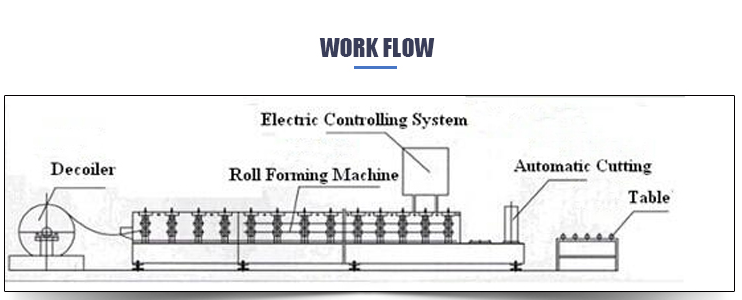Trapezoidal Roofing Sheet Roll Forming
Machine
Working principle:
steel strip is made into trapezoidal
roofing sheet by machine through cold-bend forming technology.
Usage:
Trapezoidal roofing sheet produced by roll
forming machine are widely used in construction, transportation and other
industries. It is mainly used for roofing and wall of buildings, such as steel
structures, airports, storehouses,etc.
Component:
1.Decoiler
2.Roll Forming System
3.Cutting Device
4.Hydraulic Station
5.PLC control system
Working Flow:
Loading coil – decoiling – guide feeding –
main roll forming – hydrarlic cutting – finished products
Trapezoidal roofing sheet Roll Forming
Machine Technique Parameters:
Processing material: aluzinc/galvanized steel/colored steel coil
Material thickness: 0.3-0.8mm
Main motor power: 4kw(can change as request)
Pump power: 4kw
Shaft diameter: 75mm and solid shaft
Forming steps: 15steps and more
Roller material: high grade 45# steel, hard Chromium plating
Main frame:300H steel
Medium plate thickness: 16mm
Speed:8-12m/min
Material of the cutting blade:Cr12
Control system: PLC computer control
Power supply:
380V, 3 Phase, 60Hz (can change as customers request)
Trapezoidal roofing sheet profile series:
Our Trapezoidal roofing sheet Roll Forming
Machine can greatly simplifie the production process and improve production
efficiency.
Welcome visit our Factory!
Trapezoidal Roofing Sheet Roll Forming Machine Trapezoidal Roofing Sheet Roll Forming Machine,Sheet Crimp Machine,Roofing Sheet Roll Forming Machine,Trapezoidal Cold Roll Forming Machinery CANGZHOU DIXIN ROLL FORMING MACHINE CO., LTD , http://www.hebeimachine.com
The experiment was carried out in the greenhouse of the Agricultural Demonstration Park in Lancang Town, Santai Town, Dongtai City. The nursery adopts the light-substrate tray method, and the temperature and humidity are detected by a warm-humid light carbon dioxide recorder, and then controlled by computer intelligence. The errors do not exceed ±0.5°C and ±RHS%, respectively. There are a total of 13 treatments in this test, of which 12 treatments are different temperature and humidity settings (different humidity in three sections of low temperature, medium temperature, and temperature adjustment), and one is a conventional nursery control (CIA). The temperature regulation adopts the boiler hot water pipe circulation heating, the humidity adjustment adopts the fan ventilation and spray, the treatment spacing is 3.5m, is completely separated by the two-layer film, all the tests are carried out in the greenhouse, all the processing temperatures are Above 18°C, it can meet the normal temperature requirement for nursery.
The parameters in the test space were measured using a thermo-optical light carbon dioxide recorder. The range of temperature adjustment was 1,803,35.50C (low temperature, 18.50C, 230C, medium temperature, 24.50C, 290C, and high temperature, 30.50C, and 350C). The humidity adjustment range was Relative humidity 60%} 90%. The temperature adjustment gradients are respectively 18.50C, 200C, 21.50C, 230C, 24.50C, 260C, 27.50C, 290C, 30.50C, 320C, 33.50C, 350C, and the gradient of the humidity adjustment is 60%RH, 70%RH, respectively. 80% RH, 90% RH, 12 treatment temperature, humidity combination set to (18.50C, 60% RH), (200C, 70% RH), (21.50C, 80% RH), (230C, 90% RH ), (24.50C, 60%RH), (260C, 70%RH), (27.50C, 80%RH), (290C, 90%RH), (30.50C, 60%RH), (320C, 70% RH), (33.50C, 80% RH), (350C, 90% RH), represented by treatment codes T1, T2, T3, T4, TS, T6, T7, T8, T9, T10, T11, T12, respectively; The code name is CIA, which is carried out according to the conventional method of factory cultivation. The test site is a solar greenhouse in the north and south direction. The plot is 10mZ for each treatment inspection and is selected at the same position in the middle of a standard breeding bed (50mx2m). The plug specification is: 25cm x 50 (two, 200 points/pan, 80 trays per treatment) , 16,000 hole seedlings; sowing: Taiwan Keyang PN-20-2 needle seeder; the treatment room are sealed with a film, the interval between processing is 3.5m.
According to the data recorded by the temperature-humidity carbon dioxide recorder, statistical analysis was performed according to the inspection data of pepper seed disintegration among various treatments. T4 treatment was the most severe, reaching 15.38%, and T9 treatment was the lightest, 0.69%, CI incidence. It was 6.71% and the average incidence rate was 4.37%. Different temperatures and humidity have effects on the incidence of shattering disease. Low temperature and high humidity can easily induce shattering disease. High temperature and low humidity can curb the incidence. According to statistical analysis of data on virus diseases among treatments, T10 treatment was the most severe, reaching 6.95%, T3 treatment was the least, with 0.46%, CI incidence was 3.82%, and the average incidence was 2.27%. Different temperatures and humidity have an impact on the incidence of viral diseases. High temperature and low humidity are suitable for virus development. Low temperature and high humidity have inhibitory effects on viral pathogens.



The cultivation of off-season vegetables is generally based on greenhouse cultivation. As far as Dongtai is concerned, its anti-season green pepper planting area has reached 250,000 mu. In the long-term cultivation and seedling raising process, it has also been found that if the temperature and humidity are not adjusted in the breeding process, a large area of ​​seedling disease will occur. Therefore, it is very important to study the law of occurrence of green pepper diseases on the development of agricultural production. Intelligent control is a kind of high-tech agricultural technology, which has the advantages of energy saving, labor saving and environmental friendliness. It can reduce the disease at seedling stage and increase the commercialization rate of nursery, in order to obtain the best economic benefits.